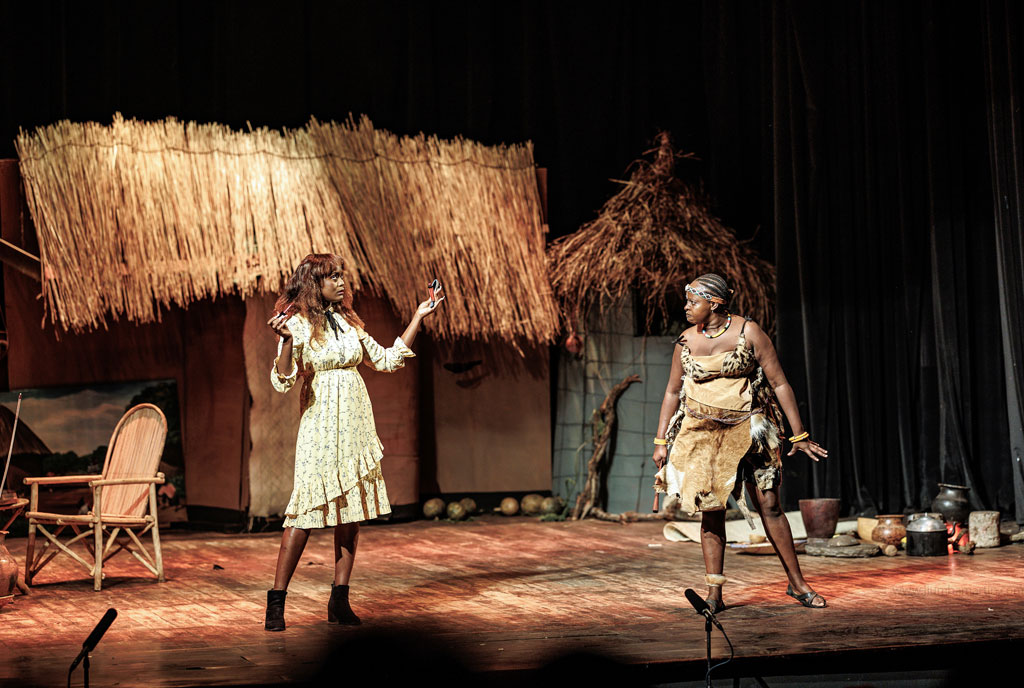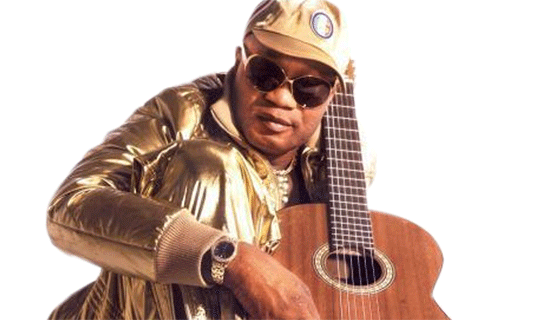
Destiny Chaiga (left) plays as Clementine and Sharon Atuhaire as Lawino in the musical production Echoes of Lawino at the National Theatre in Kampala. Photo | Martin Jjumba
By Bamuturaki Musinguzi
Okere Community Development Project, a rural community initiative based in Otuke District, has adapted two of Okot p’Bitek’s poems for a musical theatrical production titled Echoes of Lawino.
The production—centred around Song of Lawino (1966) and Song of Ocol (1970)—was staged during the first weekend of June. It cast Sharon Atuhaire and Mercy Awino, who both played the role of Lawino; Ojok Okello as Ocol, and Destiny Chaiga as Clementine. It was directed by Alex Kitaka and produced by Allan Odong.
Song of Lawino, a narrative poem, revolves around Lawino. As the main character, Lawino laments about Ocol—her husband, who is ready to abandon his Acholi customs and adopt the White man’s urbanised way of life.
Ocol, who is Western-educated, rejects Lawino because she is a pagan who believes in the devil. It doesn’t help matters that she can neither ball-room dance nor tune the radio.
Clementine, Ocol’s second wife, has been Europeanised, and taunts Lawino for sticking to Acholi traditions. Regardless, Lawino takes pride in her Acholi heritage and turns down attempts by her husband to relocate her to the big city.
“Husband, now you despise me/Now you treat me with spite/And say I have inherited the stupidity of my aunt;/Son of the chief/Now you compare me/With the rubbish in the rubbish pit/You say you no longer want me/Because I am like the things left behind/In the deserted homestead…,” Lawino laments, adding, “Ocol says he is a modern man/A progressive and civilized man/He says he has read extensively and widely/And he can no longer live with a thing like me/Who cannot distinguish between good and bad…”
Song of Ocol is Ocol’s reply. He promises to break away from his Acholi heritage, including the taboos and bride price. He wonders what benefits came with independence from British colonial rule. He makes a mockery of the colonial government. He decries the naming of streets after colonialists, and the effects of rural-urban migration. He asks the elite to explain African philosophy.
Ocol is determined to see his culture destroyed in favour of the “modern” Western culture, and at one point rhetorically asks: “What is Africa/To me?” His response leaves little to one’s imagination.
“Africa/Idle giant/Basking in the sun/Sleeping, snoring/Twitching in dreams,” he declares, adding that the continent is “diseased with a chronic illness/Choking with black ignorance/Chained to the rock/Of poverty…”
The dances and songs in the musical theatrical production were all from Lango. Okeme and Abuda songs, as well as dances, were performed by the local people from Okere. They, for one, performed the local rendition of Waloyo Yamoni, a Lango rainmaking song composed by Christopher Tin.
“Over half a century since the publication of Song of Lawino and Song of Ocol, Africa has gone through fundamental political, economic, and social shifts,” Ojok Okello, the executive producer, tells Sunday Monitor, adding, “But many questions about African identity, history, heritage, and values remain complex themes. To date, Africa finds itself grappling with how to forge a sustainable path to the future that recognises and appreciates its complex histories and foundations. Creating her future, grounded in strong cultures and complex histories is an uphill task she must climb.”
Okello addresses the issue of authenticity, adding that the play was” intend[ed] to spark and join the chorus of voices daring to reimagine a more decolonised African people.”
According to Odong, the aim of this production is to raise Shs50 million for the construction of a community amphitheatre in Otuke District under “Okere City”. “Utilisation of the arts for community transformation should be one of the avenues we need to look into as social workers,” he reveals, adding, “The community amphitheatre will be utilised to bring about social transformation using art. It will be a centre of art excellence that will be utilised to host art residences, host art festivals up in the north; it will have a museum where people can go learn about the history of the Okere people and the Lango culture.”



























































